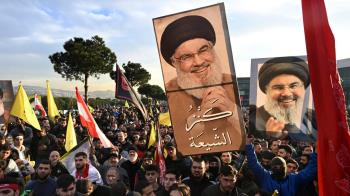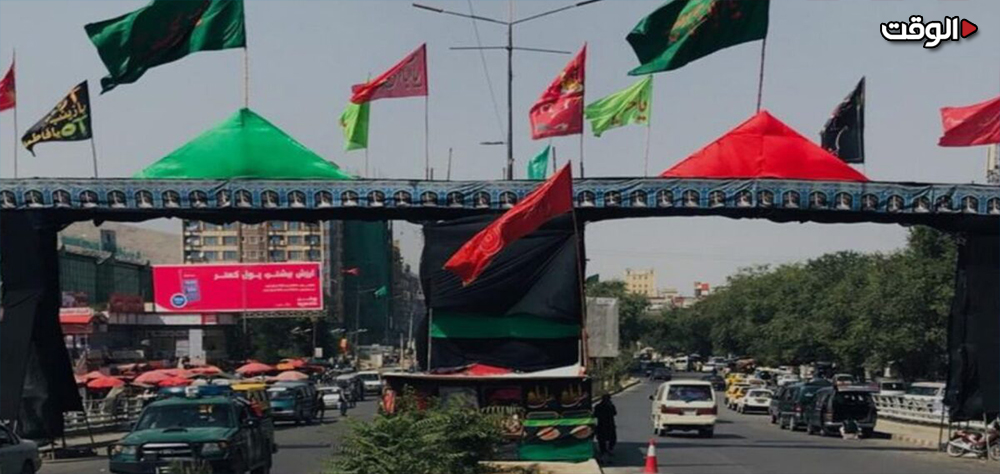Alwaght- While earlier claiming that the Shiite Muslims are free to conduct their religious rituals, the Taliban in Afghanistan this year have cracked down on them for Muharram mournings, drawing discontentment and protests of the citizens.
According to data provided by Afghanistan media, the Taliban officials have asked Shiite communities in the country to avoid public gatherings, flying signs, and putting posters during Muharram, the month of mourning of grandson of Prophet Muhammad, Imam Hussein, in Husseiniyahs and mosques and public places. The ruling group restricted the number of places where citizens can establish mowkebs (service stations) and banned pavions from distributing free meals, known as nazri.
According to New Kabul news outlet, local sources in Kabul and western Herat provinces reported that Taliban security agents forcibly removed dozens of flags and banners throughout these provinces and in some cases desecrated the Ashura flags.
Mourners told Amo news that the Taliban said that they have imposed heavy restrictions on the religious ceremonies.
The mourners further said that the ceremony of raising the flag of Hazrat Abbas, the half brother of Imam Hussein, during the seventh day of Muharram month was restricted to inside the mosques.
Also, officers beat Shiite mourners protesting these measures. Taliban agents in Herat province arrested at least two mourners four days ago for so-called violation of the restrictions.
Taliban restrictions draw public protest
The new bans and Taliban forces' treatment of Muharram mourners have led to protests by Shiites in different provinces of Afghanistan who want the Taliban regime to refrain from interfering in religious affairs.
The protests in Herat came after Ahmadullah Motaghi, the head of the Taliban's information and Culture Department in Herat, described the way Ashura was held as a political and foreign heresy in a meeting with the Shiite scholars of the province on Friday. In anti-Shiite and divisive remarks, he said: "We must avoid heresy that originates from political aspects... This way of msrking Ashura does not exist in Islam. We must prevent foreign heresy."
These insulting and divisive remarks were made while according to Iran Press news agency a few days ago, the officials of the Hajj and Awqaf Ministry attended a consultative meeting with Shiite scholars and students in the west of Kabul and promised secure Muharram ceremonies. Government officials stated that Ashura and the school of Imam Hussain belong to all Muslims and all preparations have been made to ensure the complete security of this event.
According to the Hajj and Awqaf Ministry, Muharram mourning ceremony will be held this year in more than 70,000 mosques across the country, including more than 10,000 Sunni mosques, of which 500 mosques belong to Shiites in Kabul alone.
But despite the promises, like the past year, this year restrictions have been imposed on marking of Muharram by the Shiites and lovers of Ahl Al Bayt, the nickname for the family of Prophet Muhammad.
A citizen from Herat says that "the Taliban restrict deep-rooted religious and cultural values of Ashura. These restrictions should not exist.
Another mourner said that this is a deep disrespect to the Shiite community and people of Afghanistan. Another one warned that the Taliban should not test people's patience more by imposing severe restrictions on the Shiite community.
Recently, some groups have tried to lower the flags and inflame religious disputes to create division among the people of Afghanistan and threaten their security.
According to the video published on social networks, the followers of Ahl Al Bayt in Herat, in response to the restrictions and in protest to the recent remarks of a Taliban official, launched a protest convoy in Herat city and chanted Labayk Ya Hussein.
This protest convoy roamed the streets of Herat on Sunday night and showed its opposition to the restrictions and statements of the head of the Taliban Information and Culture Department.
The images shared on social platforms showed hundreds of motorcyclists were moving in the streets of Herat city in the middle of the night, raising mourning flags.
At the same time, some protestors say that following the tension between the mourners and the Taliban, the city has taken on a military atmosphere.
In the meantime, some sources in the Shiite-majority neighborhood of Jibril have reported that a protester was killed by Taliban security forces.
A source said that this man, identified as Habib, had installed the Muharram mourning flag on his motorcycle. Taliban security forces in Jibril tore this flag and as a result, a fight broke out between them. According to the report, the Taliban forces directly shot at Habib and killed him.
Another account of his death suggested that Habib protested in front of a Taliban checkpoint at night telling the security forces that this group should not impose restrictions and tear the flags for the Muharram ceremony, but the Taliban forces shot him in front of the checkpoint.
The protests in recent days come as last year in Muharram banned large Shiite religious gatherings and ceremonies commemorating Imam Hussein in several provinces including Kabul, Herat, Ghazni, and Mezar-i-Sharif.
Last year, Taliban security agents committed violence in many provinces of the country. In one case, they opened fire on an Ashura mourning ceremony in Ghazni, killing at least four people and injuring more than 30 others.
Shiites' conditions disclose Taliban's empty rhetoric of inclusive government
Before Taliban's takeover of power in August 2021, the Shiite community was holding its mourning ceremonies without any restrictions.
But with Taliban's assumption of power, Shiites faced serious restrictions in conducting their religious rituals despite the Taliban's promise about forming an inclusive government and respecting all ethnicities and religions.
These discriminatory behaviors of the Taliban government led the United States Commission on International Religious Freedom (USCIRF) to confirm harassment, violence and severe restrictions on religious practices against the Shiite community under Taliban rule in its annual report published in early May.
The report asserts that the Taliban imposes a strict interpretation of Sharia law and violates the religious freedom of those with different interpretations of Islam and minority groups.
This rights organization discussed the examples of the Taliban's interference in the religious ceremonies of the Shiites, and discussed the last year's Eid al-Fitr incident, during which the Taliban checkpoint forces on April 21, 2023, cracked down on the Shiites whose Eid Al Fitr date conflicted with that announced by the Taliban and forced them to break their fast.
This report has also highlighted the restrictions on Shiite mourning practices during Muharram and the prevention of public celebrations of Eid al-Adha as other examples of these religious restrictions.
In all Islamic countries, there is a population of Shiites, but in Afghanistan, although there is a significant population of Shiites, there are no accurate statistics of their number. However, due to the relationship between this religion and the Hazara ethnic group as one of the four largest ethnic groups in Afghanistan, statistics have been presented in this field that suggest between 9 and 12 percent of Afghanistan population are Shiites. Some non-government statistics put this percentage at 20.
The Taliban have always explicitly or implicitly announced that they seek a good government and treatment of the citizens and friendly ties with other countries, especially neighbors. But up to now, not only no Shiite is included in the government of the Taliban, but also no place and rights for Shiites are so far defined, which is a source of concern.
As long as the Taliban do not consider the rights and privileges of all the people of Afghanistan, and most importantly, the large religious and ethnic groups in the structure of power and governance, not only they will not serve the Islamic-style social justice the group fought for a long years, but also it fails to gain internal acceptance and international legitimacy.



























